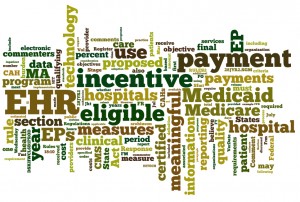Meaningful use has defined the data that should be included in a clinical summary. According to Stage I, the following demonstrates the minimum requirement necessary to qualify for this measure.
"Just the facts, ma'am." That about sums it up. This summary includes the required data and can easily be extracted from the EHR.
But it doesn't do much else. It certainly doesn't engage the patient, provide them with actionable knowledge or meet the spirit of the meaningful use measure.
However, with minimal provider data entry, well thought out templates and re-formatting with the goal of patient engagement, the clinical summary can be packed with actionable knowledge. That same visit could produce something like this:
Presenting patients with knowledge about their health is a key in engaging them as active participants in their care. As medical providers, we need to demand that EHR vendors provide us with tools that will meet this need.
Meaningful Use Stage II comment period opens next week. We need to provide feedback so that loopholes like the one above are eliminated. What good is meeting program requirements if we haven't met the needs of the patient?





